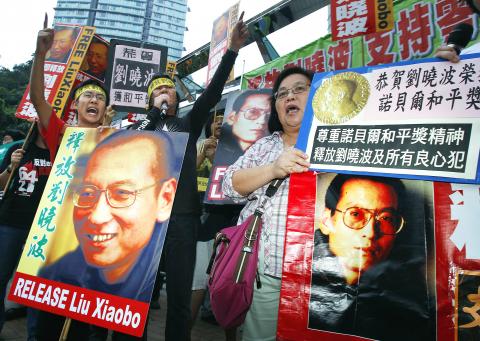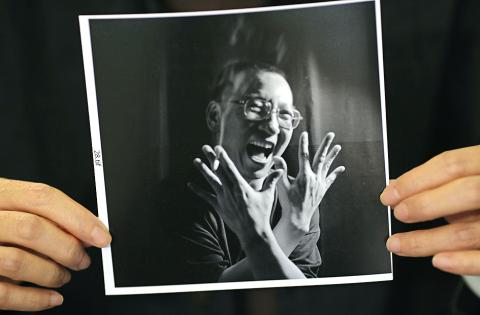Imprisoned Chinese dissident Liu Xiaobo (劉曉波), a key participant in the “Charter 08” initiative, was awarded this year’s Nobel Peace Prize yesterday for using non--violent means to demand fundamental human rights in his homeland, igniting a furious response from China, which accused the Norwegian Nobel Committee of violating its own principles by honoring “a criminal.”
Chinese state media immediately blacked out the news and Chinese government censors blocked Nobel Prize reports from Web sites. China declared the decision would harm its relations with Norway, while the Nordic country responded that was a petty thing for a world power to do.
Hours after the announcement, President Ma Ying-jeou (馬英九) congratulated Liu for winning the prize and called on China to address human rights issues with a more liberal attitude.

PHOTO: REUTERS
In a written statement, Ma described Liu’s winning the award as bearing “significant historical meaning” for the development of human rights in China, as well as Chinese communities around the world.
“We expect mainland China to address the issue of human rights with a whole new attitude, solve major human rights incidents with honesty and confidence, and treat dissidents with more tolerance,” Ma said.
The Chinese Nationalist Party (KMT) also congratulated Liu.

PHOTO: REUTERS
“Freedom, democracy and human rights are universal values, and Mr Liu’s winning the award at this time bears significant meaning,” KMT spokesman Su Jun-pin (蘇俊賓) said.
Presidential Office spokesman Lo Chih-chiang (羅智強) said Ma reiterated comments made previously on the anniversary of the Tiananmen Square Massacre that, in addition to economic development, China should seek breakthroughs in the development of human rights.
This year’s peace prize followed a long tradition of honoring dissidents around the world and was the first Nobel for China’s dissident community since it resurfaced after the Chinese Communist Party launched economic, but not political, reforms three decades ago.
Liu, 54, was sentenced last year to 11 years in prison for subversion. The Nobel committee said he was the first to be honored while still in prison, although other winners have been under house arrest or imprisoned before getting the prize.
Chinese authorities would not allow access to Liu yesterday.
His wife, however, expressed joy at the news. Surrounded by police at their Beijing apartment, Liu Xia (劉霞) was not allowed out to meet reporters. Instead, she gave brief remarks by phone and text message, saying she was happy and that she planned to go today to deliver the news to Liu Xiaobo at the prison, 500km away.
The Chinese Foreign Ministry lashed out at the Nobel decision, saying the award should have been used instead to promote international friendship and disarmament.
“Liu Xiaobo is a criminal who has been sentenced by Chinese judicial departments for violating Chinese law,” the statement said.
Honoring him “runs completely counter to the principle of the prize and is also a blasphemy to the peace prize,” it said.
The Dalai Lama also issued his public congratulations to Liu Xiaobo.
“I would like to take this opportunity to renew my call to the government of China to release Liu Xiaobo and other prisoners of conscience, who have been imprisoned for exercising their freedom of expression,” the spiritual leader said.
In a statement, released minutes after the announcement of the award, the Democratic Progressive Party (DPP) said it welcomed the decision to award Liu Xiaobo, adding that it was “deeply concerned” about the state of human rights in China
“Democracy, freedom and human rights are universal values,” the DPP said. “Liu [Xiaobo’s movement] was a call on the Chinese government to realize human rights and start democratic reform, leading to a democratic constitution.”
The party also said the government should redouble efforts to try to export democratic and human rights values to China through greater cross-strait exchanges.

Seventy percent of middle and elementary schools now conduct English classes entirely in English, the Ministry of Education said, as it encourages schools nationwide to adopt this practice Minister of Education (MOE) Cheng Ying-yao (鄭英耀) is scheduled to present a report on the government’s bilingual education policy to the Legislative Yuan’s Education and Culture Committee today. The report would outline strategies aimed at expanding access to education, reducing regional disparities and improving talent cultivation. Implementation of bilingual education policies has varied across local governments, occasionally drawing public criticism. For example, some schools have required teachers of non-English subjects to pass English proficiency

‘FORM OF PROTEST’: The German Institute Taipei said it was ‘shocked’ to see Nazi symbolism used in connection with political aims as it condemned the incident Sung Chien-liang (宋建樑), who led efforts to recall Democratic Progressive Party (DPP) Legislator Lee Kun-cheng (李坤城), was released on bail of NT$80,000 yesterday amid an outcry over a Nazi armband he wore to questioning the night before. Sung arrived at the New Taipei City District Prosecutors’ Office for questioning in a recall petition forgery case on Tuesday night wearing a red armband bearing a swastika, carrying a copy of Adolf Hitler’s Mein Kampf and giving a Nazi salute. Sung left the building at 1:15am without the armband and apparently covering the book with a coat. This is a serious international scandal and Chinese

TRADE: The premier pledged safeguards on ‘Made in Taiwan’ labeling, anti-dumping measures and stricter export controls to strengthen its position in trade talks Products labeled “made in Taiwan” must be genuinely made in Taiwan, Premier Cho Jung-tai (卓榮泰) said yesterday, vowing to enforce strict safeguards against “origin laundering” and initiate anti-dumping investigations to prevent China dumping its products in Taiwan. Cho made the remarks in a discussion session with representatives from industries in Kaohsiung. In response to the US government’s recent announcement of “reciprocal” tariffs on its trading partners, President William Lai (賴清德) and Cho last week began a series of consultations with industry leaders nationwide to gather feedback and address concerns. Taiwanese and US officials held a videoconference on Friday evening to discuss the

PERSONAL DATA: The implicated KMT members allegedly compiled their petitions by copying names from party lists without the consent of the people concerned Judicial authorities searched six locations yesterday and questioned six people, including one elderly Chinese Nationalist Party (KMT) member and five KMT Youth League associates, about alleged signature forgery and fraud relating to their recall efforts against two Democratic Progressive Party (DPP) legislators. After launching a probe into alleged signature forgery and related fraud in the KMT’s recall effort, prosecutors received a number of complaints, including about one petition that had 1,748 signatures of voters whose family members said they had already passed away, and also voters who said they did not approve the use of their name, Taipei Deputy Chief Prosecutor